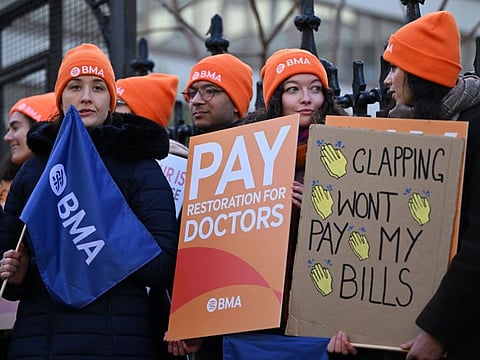UK: Why are England’s junior doctors on longest-ever strike? What will be its impact amid rising flu, COVID cases? All you need to know
7.7 million patients on NHS’s waiting lists, about half million more than last January

Dubai: Thousands of junior doctors in England started a record-breaking six-day walkout on Wednesday morning. Their strike action is set to continue until 7am on January 9 — the longest in the history of the 75-year history of the National Health Service (NHS).
The industrial action by junior doctors represented by the British Medical Association (BMA) comes at one of the busiest times of the year for the state-funded NHS, when it faces increased pressure from winter respiratory illnesses, and follows a three-day strike just before Christmas.
Amid an increase in COVID infections and a sharp rise in influenza cases, the strike is set to pile pressure on the NHS and undermine one of Prime Minister Rishi Sunak’s core pledges to voters ahead of a general election expected this year: To reduce hospital waiting lists that remain near record levels.
About 1 in every 24 people in England and Scotland has COVID, with London the worst-affected area as the highly infectious JN.1 variant spreads rapidly, a report last month said.
About 7.7 million patients were on the NHS’s waiting lists at year-end, about half a million more than last January, when Sunak made his promise to reduce them.
In a statement, the union urged the government to make a “credible” pay offer to end the strikes. Here is all you need to know:
Who is a junior doctor?
A junior doctor is any medical school graduate with one to nine years of experience as per the NHS system.
Junior doctors are qualified physicians who work under the guidance of senior doctors and make up a large share of the medical community.
The strikes only involve junior doctors in England.
Other than BMA members, junior doctors from the Hospital Consultants and Specialists Association union are also joining colleagues on picket lines.
NHS consultants took strike action in September and October and agreed to an extra 4.95 per cent pay rise for senior doctors on top of the annual 6 per cent increase already offered to them by the government.
What are their demands?
The union is seeking a 35 per cent improvement, which it says is needed to cover the impact of inflation over several years.
The BMA abandoned talks with the government after being offered a pay rise of 8 per cent to 10 per cent, and held strikes from December 20 to 23.
The BMA claims junior doctors in England were subjected to a 26.1 per centreal terms pay cut between 2008 and 2022.
What’s their pay like?
First-year doctors on 2016 contracts get paid £32,398 (about Dh150,270) a year — while those on the previous 2002 contract earned £28,274, according to the BMA website.
The government, which has agreed new pay deals with other healthcare workers, including nurses and senior doctors in recent months, has resisted hikes it says would worsen inflation.
What will be the impact of the walkout?
The impact of the strike will be huge. Tens of thousands scheduled appointments and operations will be cancelled during the walkout across England
More than 7.7 million are already on waiting lists seeking treatment in England.
Cumulatively, the NHS, which has provided healthcare free at the point of use since it was founded in 1948, cancelled 1.2 million appointments since strikes began in 2023.
The 144-hour strike is likely to be the most disruptive in the history of the NHS. It is the longest strike by junior doctors yet, so the number of patients affected is likely to be higher than any previous period of strike.
And the strike is taking place in January, in which NHS officials typically expect the most severe winter pressures.
Is NHS prepared to deal with the situation?
The national health service says emergency care will be prioritised including services such as A&E, critical care, maternity services and neonatal care.
The most senior doctors, consultants and other staff who are not on strike will be deployed to cover these areas, which will mean their usual work will not go ahead, so appointments and operations will be postponed.
What does the NHS say?
“This January could be one of the most difficult starts to the year the NHS has ever faced,” Stephen Powis, NHS national medical director in England, said.
“The action will not only have an enormous impact on planned care, but comes on top of a host of seasonal pressures such as COVID, flu, and staff absences due to sickness,” he said.
A spokesman for Prime Minister Rishi Sunak said that deals with other healthcare workers’ unions showed the striking junior doctors were “outliers”, however.
“We have sought to come to a fair resolution - fair for the taxpayer, fair for hardworking doctors and health workers,” he told reporters on Tuesday.
“We have achieved that in the majority of cases ... we are willing to have further discussions. But obviously the first thing to do is to stop striking.” (Reporting by Muvija M and Alistair Smout; Editing by Ed Osmond and Clarence Fernandez)
In Wales, junior doctors are striking later this month — for three days from 7am on January 15 to the same time on January 18.
Junior doctors in Northern Ireland will also walk out for 24 hours from 8am on 6 March if BMA members vote for strike action during their six-week ballot period beginning on 8 January.
In July, the BMA secured a 12.4 per cent pay rise for junior doctors in Scotland for the year 2023/2024. Combined with the 4.5 per cent rise they secured the year before, it totals a 17.5 per cent increase over two years.
Sign up for the Daily Briefing
Get the latest news and updates straight to your inbox


